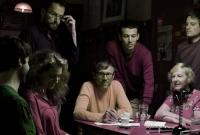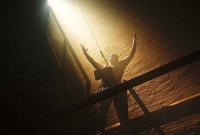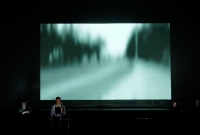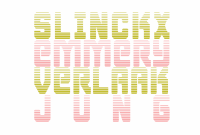We are very proud to be welcomed “in residence” for three concerts at the Musikfestivalbern Festival 2025. This pleasure is twofold, as the composer in residence at the same festival is Svetlana Maraš — with whom we began collaborating in 2024 during an anthology concert with the trio 'Pony Says'. The theme of the festival, both simple and rich in contradictory meanings, consists of a single word: “Chains” — the bonds that connect us, the bonds that imprison us.
The three concerts we will present are perfectly in tune with this double meaning. They explicitly break with the codes of the classical concert, while constantly re-creating links with some of the great voices of the past, whose desires and rebellions continue to be our own.
The Festival sent us a questionnaire, and we are publishing the answers in full here.

BERN'S QUESTIONNAIRE
What do you associate with the Musikfestival Bern?
What associations does the image of a chain trigger in you?
What significance do chains have in your artistic work?
Which chains would you like to break?
ANSWER
Your questions are excellent, they are ours too, and they hit the nail on the head! They are so closely interconnected that we will take the liberty of answering them all in one go (we will leave aside your question about recent work that has moved us, which we will address at the end).
We immediately see the very fertile double meaning you place in the words ‘chain’ and ‘link’: there are indeed links that imprison, and then there are links that liberate. However, we don't really want to play with this ambiguity until nightfall, with the nuances and politeness of a theological symposium. We have to choose. It's time to ask ‘what time is it?’ And we think it's high time to recreate bonds, to love our bonds, and to learn to humble a little the Rational and Autonomous Subject within us, and its Splendid Isolation. It's time to say that our loneliness is killing us, that we want to get back to full speed, and with music, the conversation with the thousand sensibilities that weave the world together. When it comes to mocking the classics, or perpetuating the grand spectacle of provocation — yes, why not, but we'll look at it ater. For now, we need to gather our strength. And wear out our shoes, and go and talk even to ghosts (this is Hannah Arendt's lesson: a cultured person is not someone who knows a lot, but simply someone who chooses their friends, without hierarchy, among the living as among the dead.)
What has changed for us, if we compare our work today with what was going on in the musical world ten years ago, is a certain decline in the presence of irony. From 1950 until the beginning of our century, contemporary music suffered from such a spirit of seriousness that the gigantic typhoon of criticism and performance that has swept through festivals in recent years could only be welcomed with gratitude. We had a good laugh, and the Academics got a good slap in the face, and they deserved it! But the world is pushing, pushing, pushing against the window of old Europe. You wake up one morning, and all your addictions from the day before — kitsch, sarcasm, critical thinking, fire-starting intelligence — suddenly seem like a little machine that's a bit too well-oiled. Irony and critical thinking will remain necessary, of course, but we also felt the need to open up a new chapter in our artistic practice... how can we put it? — a chapter that is a little less defensive. We are entering the era of ‘strange strangers’ so aptly described by Timothy Morton.
Humans or non-humans, animals, ghosts or machines: the globalised world is populated by an infinite number of intelligences that not only seem strange to us, but whose very strangeness is unpredictable. The stranger emerges from a place where we did not expect it. And we ourselves are strange and stranger to each other. And most certainly, we must learn today to be sufficiently counter-defensive, sufficiently modest, to be able to cope with anxiety, darkness and uncertainty, and to connect with strange strangers... oops, sorry(1), to connect between strange strangers. And all this without sarcasm, and without pretending to have all the cards in your hand, including the terrifying Last Word card — worse than death.
A reality we don't know is coming towards us: from now on, we will have to accept starting from anxiety and ignorance, and attempt an alchemical operation oriented towards joy. Mmm, no, that's wrong again… Let's remove the word ‘alchemical’ with its connotations of divisive and purifying Modernism and its Grand Seigneur tone! Let's start again; a reality we don't know is coming towards us: from now on, we will have to accept starting from anxiety and ignorance, and attempt a joy-oriented form of tinkering.
The three performances we are presenting during this residency at the Musikfestival Bern have one thing in common: like octopuses, they send out pseudopods in all directions and attempt to forge new connections (with Indian Carnatic music, the creative music of the AACM Chicago, Ars Subtilior, choreographic formalism, Viennese Romanticism, Elizabethan melancholy, postmodern micro-narratives, and much more). But we take the risk of connecting these bare electrical wires, flat on the table, without the veneer of self-irony. The risk of ‘practising curiosity without sadism’, as Donna Haraway writes. Criticism will be your task, dear audience. And we will be more than happy to discuss it with you! Come and find us in friendship: high culture is made in brasseries, said old Freud; if that is the case, we're ready.
Another thing we should point out, to conclude, is that medieval music, as well as that of the AACM or Jürg Frey, does not reside entirely in a score. The music we like to play can often only emerge through collective decoding, which requires a great deal of individual responsibility and interdependence among all the musicians. To put it briefly, one could say that the keyword in modern music has been Structure; then came the question of Sound; then the question of the Stage; and today it is the question of how we work together as a collective.
(1)Yes, moving away from egocentrism, Eurocentrism and normocentrism is more than a decision, it is a series of mistakes and repeats, it is a discipline, it is a grammar to be explored — just like in music, have you noticed?

BERN'S QUESTIONNAIRE
Which work of art has recently captivated you so much that you can't get it out of your head?
ANSWER
Composer Brendan Champeaux recently composed a strange, haunting, beautiful piece for Ictus, inspired by excerpts from the book Thorow by American poet Susan Howe. He then gave us the book, which literally captivated us…
‘Thorow’ plays on the name of the poet Henry David Thoreau and on an obsolete spelling of the word ‘thorough’, which evokes the idea of passage (passage through civilisation, as through a frozen pond). We still need enigmatic writings. Hidden in the enigma of complex writing is a dark and damp element that protects us from the atrocious sun of efficiency. Howe's writing is enigmatic in a particular way: there are spelling mistakes, stutters, doubts. She works from a place of weakness.





